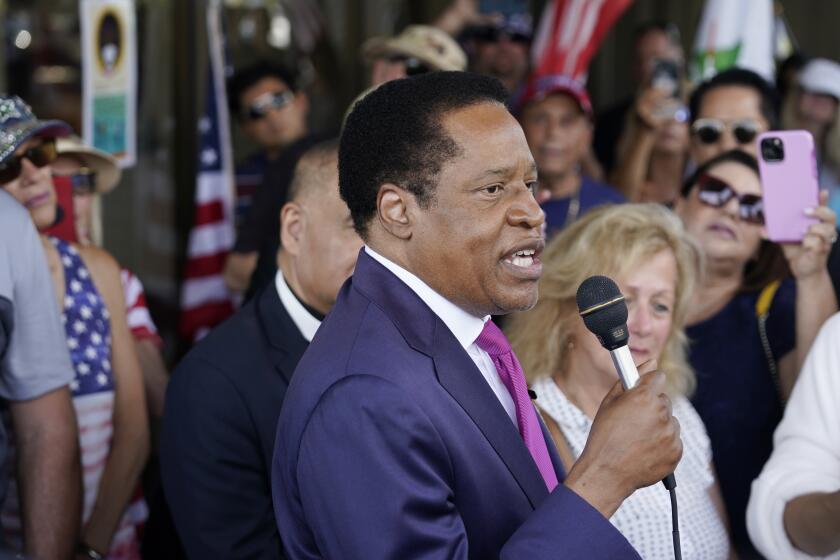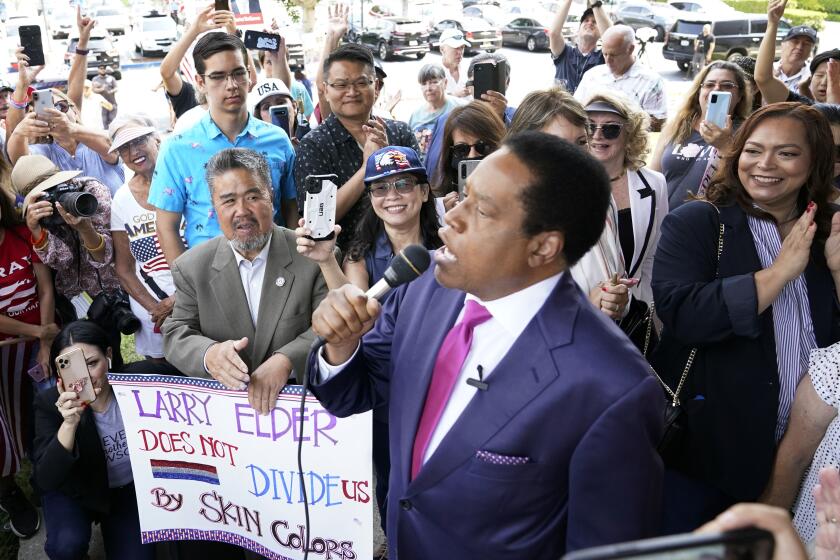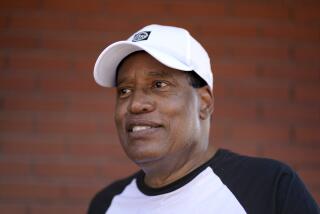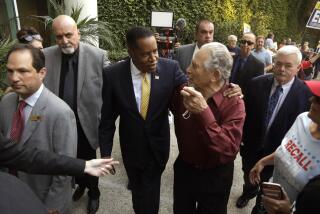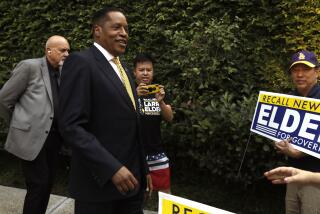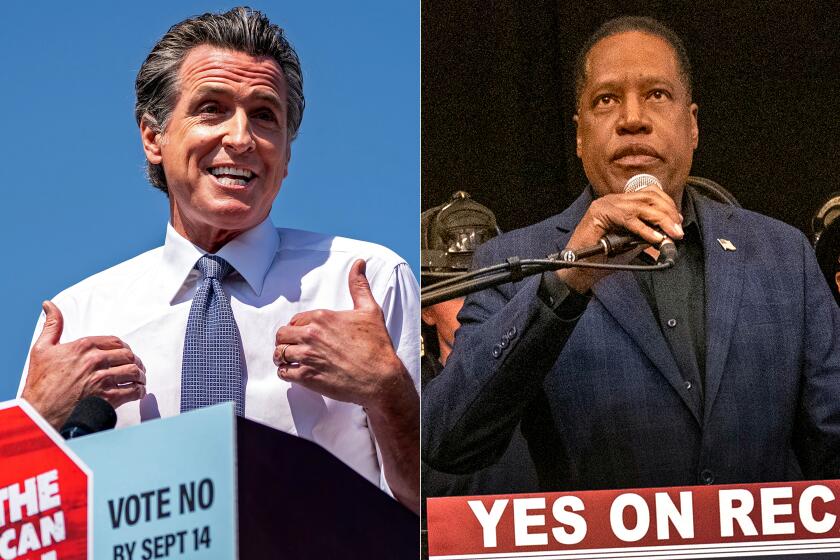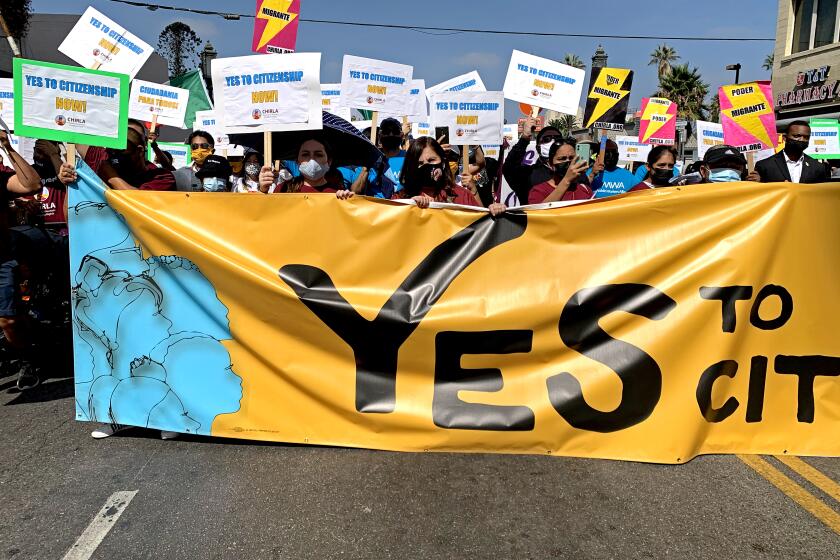Larry Elder’s recall campaign targets a new opponent: the press
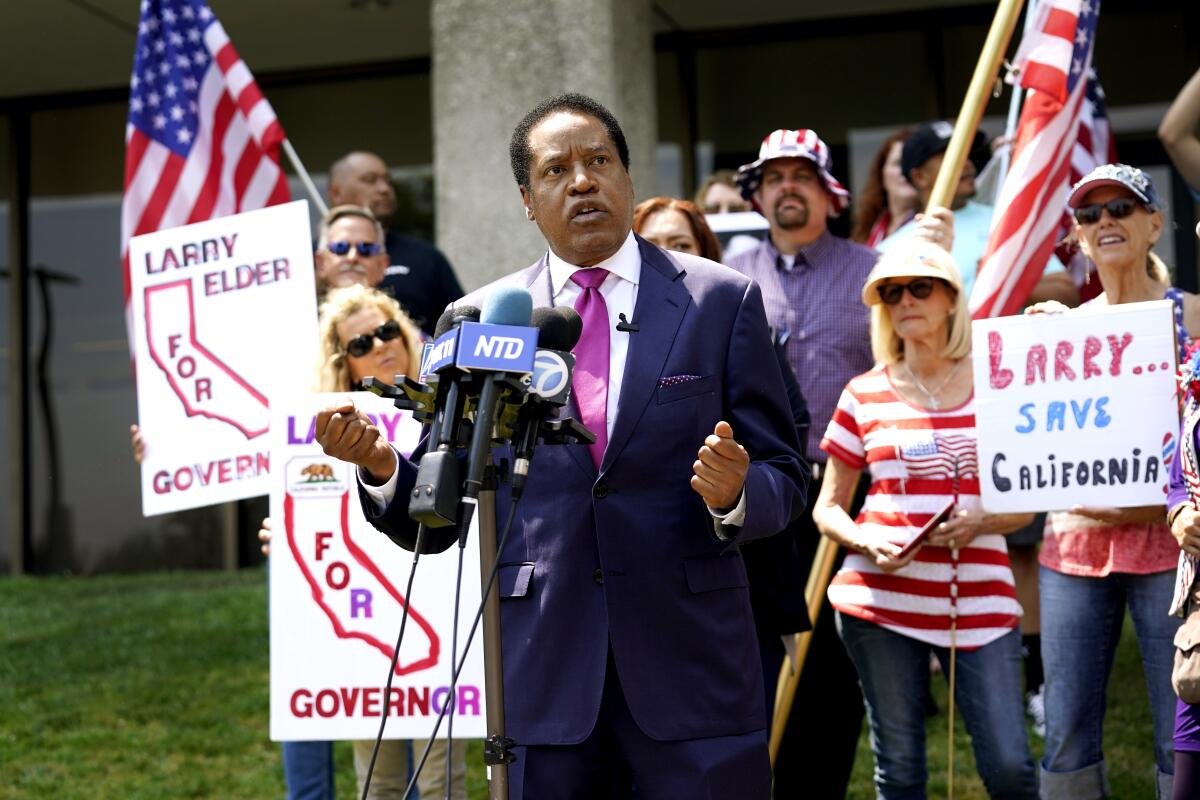
- Share via
Leading in the polls and fundraising amid a crowded field in the campaign to try to replace Gov. Gavin Newsom, talk radio personality Larry Elder has launched a time-honored new front in the California recall election: bashing the media.
Elder has banned one of the state’s top newspapers from covering his events and refused to take questions from a Los Angeles Times opinion columnist, depicting himself as a victim of duplicity and unfairness.
The Elder campaign revoked the Sacramento Bee’s access Monday, contending that the newspaper “doctored” responses the candidate gave for an online “Voter Guide” feature. Elder included critiques of Newsom in his written responses. The Bee’s editors edited out the attacks, saying they had requested candidates limit their responses to policy.
A few days earlier, Elder sharply rejected Times columnist Jean Guerrero when she tried to ask him a question about immigration during a video interview with opinion editors and writers from the newspaper. The candidate’s spokeswoman accused the writer of engaging in “bigotry masquerading as journalism.”
The media bashing echoes past rebukes by conservative politicians, from Richard Nixon to Donald Trump. Experts said the attacks may help Elder whip up excitement among his most fervent supporters.
Larry Elder leapfrogs the others vying to replace Newsom, with provocative stances from firing teachers to downplaying the dangers of secondhand smoke.
”Republicans really, really don’t like the media, so any critique of the media is welcome among Republican voters,” said Jack Pitney, a professor of government at Claremont McKenna College.
Conventional political wisdom for generations held that candidates had to maintain some relationship, even with media outlets they considered hostile, because they could not take the risk of losing any avenue to communicate with voters. Politicians now choose from a vastly wider array of platforms and often try to sidestep traditional outlets to reach the public.
The recall also presents an unusual calculus in which challengers only need to get more votes than rivals to replace the governor, if Newsom does not reach 50%-plus-one of the vote.
“This is a different kind of campaign, where he does not have to reach a broad electorate to win,” said Pitney, who previously worked for Republican candidates. “He just needs to fire up his core supporters.”
Elder’s campaign issued a press release Tuesday explaining why it planned to block all the Sacramento paper’s reporters, photographers and editors from attending its events.
Elder had provided written answers to a series of questions early in August and learned only several days later that the Bee “would not allow negative answers to other candidates,” his campaign said. The newspaper asked Elder’s campaign if it wanted to edit its previous replies, but then published the Voter Guide with its own revisions “without receiving permission or feedback from the Elder campaign,” the campaign said.
After the objection, Elder’s responses were deleted on Sunday. But Colleen McCain Nelson, the paper’s executive editor, reversed that decision, and Elder’s answers were again posted on the Bee website on Monday, according to the campaign.
The newspaper offered a sharply different account of the spat over the Voter Guide. In an editorial published Wednesday morning, the Bee explained that it does not allow attacks on other candidates in the guide because “the format doesn’t provide them an opportunity to respond, as a typical news story would.” The paper also suggested it intends for the guide to be focused on issues, not personalities.
Elder did not respond to a request to revise his Voter Guide answers — omitting personal attacks — for six days and replied only after the feature was published, the Bee said.
“The other recall challengers adhered to the rules,” the Bee’s editorial said. “The fact that Elder would rather pick a public fight with The Bee says a lot about the kind of governor he would be.”
Elder’s representatives said they had previously spent considerable time dealing with staffers from the Sacramento paper, including an hour-long meeting with its editorial board earlier this month. They said they would resume cooperation with the newspaper once the Bee had taken down the “unsanctioned content.”
Elder’s confrontation with The Times’ Guerrero came during a video discussion with Times opinion editors and writers on Friday.
Near the end of the hour-long session, Sewell Chan, editor of the editorial pages, introduced Guerrero. The columnist has written critically about Elder and the man she called his protege, Stephen Miller, who was a fixture on Elder’s radio show when he was a student and stayed in close contact with the host after he became an advisor to President Trump.
Elder and his spokesperson, Ying Ma, immediately objected to Guerrero’s participation in the group session. They said they had not been informed that the columnist would be part of the interview and would not have agreed to her presence.
The columnist said in an email that her writing in The Times and in her book about Miller “speaks for itself.”
The recall candidate has not disclosed on his state finance forms which entities are paying Laurence A. Elder & Associates.
Meanwhile, Elder amended a statement of economic interests after disclosure experts told The Times that his initial two-page filing did not meet the legal requirements. The California Democratic Party then filed a complaint with state regulators. The Elder campaign said the lack of detail on the original form was an oversight.
The new disclosure showed that Elder’s company is worth between $100,000 and $1 million, but his exact wealth is difficult to determine, because the state requires disclosure in broad dollar ranges.
Elder collected at least $10,000 from several conservative organizations, including the Alachua County (Fla.) Republican Executive Committee and Epoch Times, a far-right newspaper affiliated with the Falun Gong new religious movement.
Elder also disclosed income from the anti-abortion nonprofit Heartbeatat22, Calvary Chapel Chino Hills, Promedev Relief Factor, a supplement that claims to reduce pain, BLEXIT, the conservative nonprofit Turning Point USA and Salem Media Group, the media company that syndicates his national radio show.
More to Read
Sign up for Essential California
The most important California stories and recommendations in your inbox every morning.
You may occasionally receive promotional content from the Los Angeles Times.
